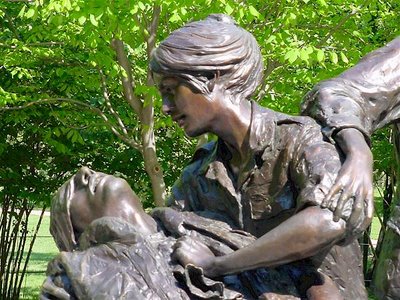 This past weekend, a documentary aired about women nurses in Vietnam. It coincided with the station's airing of China Beach, a early 90's drama about women in Vietnam. I recorded it because I knew I would be interested in it. I have had an interest in the women veterans of that war since reading Home Before Morning by Lynda VanDevanter for my American history class at UTD and because my uncle served in Vietnam in the early 70's. After watching the documentary, I knew I wanted to write about it here but I feel at a loss as to what to say.
This past weekend, a documentary aired about women nurses in Vietnam. It coincided with the station's airing of China Beach, a early 90's drama about women in Vietnam. I recorded it because I knew I would be interested in it. I have had an interest in the women veterans of that war since reading Home Before Morning by Lynda VanDevanter for my American history class at UTD and because my uncle served in Vietnam in the early 70's. After watching the documentary, I knew I wanted to write about it here but I feel at a loss as to what to say.The women featured in the documentary and in the book, Home Before Morning, experienced a year in Hell. Most of them were less than one year out of nursing school, in their late teens or early twenties. They were often promised that if they joined the military they wouldn't be sent anywhere dangerous. Some of them signed up specifically for duty in Vietnam. I remember one nurse saying that her father, a non-demonstrative man, gave her the biggest hug ever as she left and said brokenly, "I have four sons but it is my daughter I am sending into war."**
Upon arriving in Vietnam, life turned absolutely upside down. These women easily spent 10-14 hours on a shift. Steeped in blood, often without the proper supplies, they worked with doctors in a way that was not common in the states. The doctor's had to depend on them and give them more responsibility and they met that challenge heroically. More than one nurse has recounted encountering a burned soldier, holding his hand or touching his arm, only to have his blackened flesh come off with her hand. Chest wounds with shredded hearts and legs hanging by a tendon were amongst other common casualties. It wasn't unheard of for a nurse to perform an amputation. Sometimes the best they could do was reassure a soldier that he was in good hands knowing that soldier would probably die. When they were off duty, the women nurses played hard just like the men. Anything to shut out the horror that had just been and would be again soon.
After returning from being "in-country," the nurses were in a different situation than the male veterans. While the men also had a difficult time adjusting, they at least had each other as they continued their term in the military or they were better able to find each other. Of the thousands of thousands of men who served, only about 5,000 women were there so they were more isolated from each other upon returning to the states. They had no one to talk to typically. Their families usually didn't ask or want to hear about life there. They expected their daughter or sister back as they remembered her not the utterly broken woman who was returned to them. These nurses experienced post-traumatic stress disorder like the men but it was much longer before it was recognized in them.
If they continued to nurse, they found themselves in a subservient position without the respect of the doctor's they worked with now and they were not allowed to use any of the more advanced skills and training they learned in Vietnam. I remember in her book, Lynda Van Devanter eventually found her way into emergency dialysis nursing. Routine nursing was not for her. Emergency nursing provided the same burst of adrenaline that she experienced during her tour and emergency dialysis required incredible skill.
As I watched the documentary it reminded me of the interview portions of Band of Brothers. Sixty years later, the veterans of Easy Company still are haunted by and emotional when speaking of the horrors of World War II. Thirty years later, these nurses are no different and still have nightmares, deal with depression and still have questions about why the war happened and how they ended up there. Eventually, more and more nurses received help. Lynda Van Devanter herself was instrumental in raising awareness of the particular issues of women veterans. Many people worked together to honor these women and their service and in the early 90's the Women's Vietnam Memorial was erected. I hope to visit it someday.
Who's to say why one issue, topic or story strikes a chord that resonates more than another? There are so many stories of hardship and horror, recovery and redemption out there. Why did this one affect me so much? As I said, my uncle served in Vietnam. In the few years before he died, he opened up more about that experience. Knowing and loving someone who was there is probably part of the reason. Reading about Lynda Van Devanter's experience also impacted me greatly. But there is something greater about their words, their faces, their tears that makes my heart ache and I can't express it any more clearly than that.
Here are just a few links available about nurses in Vietnam.
The Women of the Army Nurse Corp During the Vietnam War
Jeanne Diebolt's Keynote Address at the Women's Memorial
Nurses and the Daily Horror of Vietnam (This is the article which discusses the documentary I mentioned.)
I wrote about my Uncle L.T. here and here and here.
**The words of the father in this story are paraphrased.

No comments:
Post a Comment